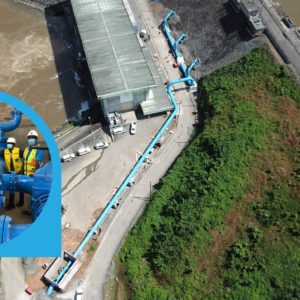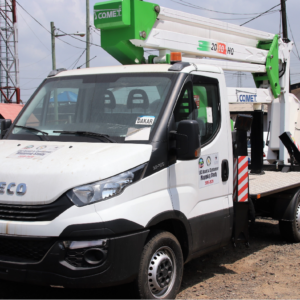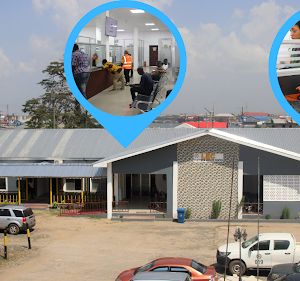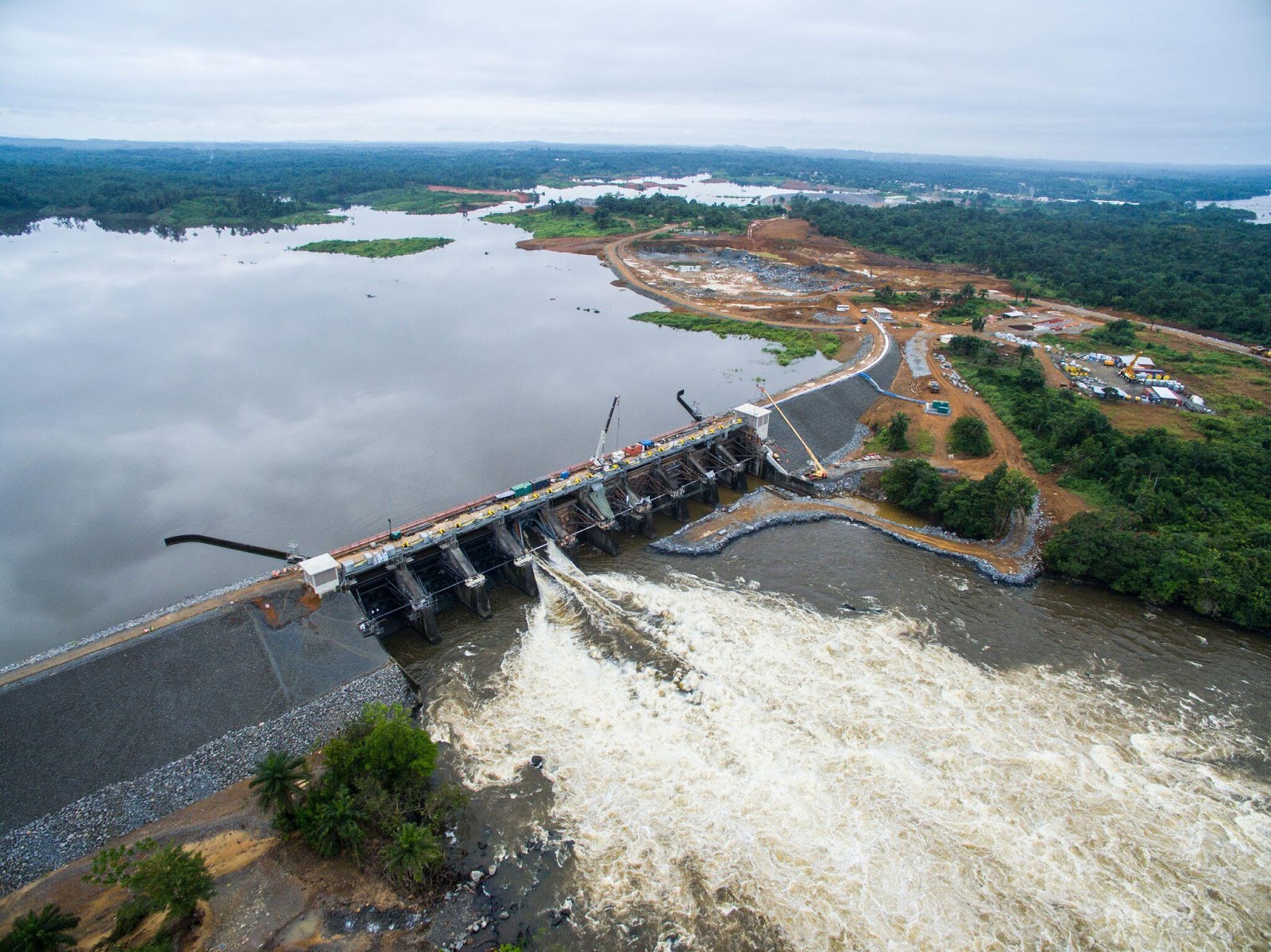PHOTO:A view of the Mt. Coffee Hydro Power Plant, downstream of the main spillway.
Monrovia – The Millennium Challenge Account-Liberia has announced the end, effective January 21, 2021, of the Millennium Challenge Compact between the United States Government and the Government of Liberia, a press release from the MCA-L has said.
The Compact has improved the amount and reliability of electricity supply, more than doubled the number of homes with electricity access, and left the Liberian government with a sustainable, data-driven road maintenance system.
With the signing of the Compact in October 2015, the United States Government, acting through the Millennium Challenge Corporation (MCC), provided US$257 million to help increase access to more reliable and affordable electricity; and improve the planning and execution of routine, periodic, and emergency road maintenance.
The goal of the support to the energy and road sectors is to help reduce poverty through economic growth in Liberia.
Mt. Coffee Rehabilitation
The Compact contributed US$146.3 million to the rehabilitation of the Mt. Coffee Hydro Power Plant, the single largest support of any donor to the power plant, constituting 40 percent of the total US$350 million spent to rebuild the hydropower plant.
With 88 MW power generating capacity, Mt. Coffee represents the largest source of power and renewable energy supply for the Liberia Electricity Corporation (LEC). Mt. Coffee has enabled LEC to expand more reliable and affordable power supply to more than 82,000 homes, businesses, and other entities, compared to a little over 34,000 when Mt. Coffee came online in 2016. Mt. Coffee also allowed LEC to reduce the average number of electricity outages by 45 percent since the start of the Compact. Outages are also much shorter now, with a reduction of 83 percent in the average duration of outages.
Electricity tariffs have also reduced from US$0.56 per kilowatt-hour to US$0.35 per kWh, representing a 37.5 percent decrease. While this is still a very high tariff, this decrease has made electricity more affordable for ordinary consumers, particularly marginalized households and small and medium enterprises. An independent study found that LEC offers cheaper and better-quality power than generators or mini-grids can provide. In focus group discussions with households and interviews with small business owners, respondents described how, once connected to LEC, they could start income-generating activities, such as selling cold drinks, or expand business operations by staying open later and offering more goods. Customers reported that their main use of electricity was lighting but also showed shifts toward using electronics and appliances. Small businesses shifted toward using freezers and large end-users shifted toward technology and machinery after connection.
At the commencement of the Mt. Coffee rehabilitation, Liberia lacked a skilled workforce to operate and maintain the hydropower plant. The project has provided for on-the-job training for operators and maintenance staff, which will allow for sustainable local operation and maintenance of Mt. Coffee. The project has already trained three generations of trainees in hydropower plant operation and maintenance.
Raw Water Pipeline Construction
The MCC compact also funded the construction of a new 48-inch diameter Raw Water Pipeline between Mt. Coffee and the White Plains Water Treatment Plant to replace a damaged 36-inch diameter pipeline that had not been in use since before Liberia’s civil war. By drawing water from Mt. Coffee, the new pipeline’s operation will eliminate saltwater intrusion into the Liberia Water and Sewer Corporation (LWSC) water treatment plant at White Plains, which occurs in the dry season when the St. Paul River experiences low water levels. With the new bigger pipeline, the municipal water supply is not only of much higher quality but because of the use of gravity flow to transport water into the system, LWSC will save an estimated US$780,000 annually in the cost of pumping water into the treatment plant. The new expanded pipeline will contribute to the increased supply of better quality water to about 1 million residents of Monrovia and surrounding areas. The total project cost is around US$18 million.

An aerial photo of the Mt. Coffee end of the Raw Water Pipeline, with a section shown in detail
LEC Management Services Contract
Aside from the investment in Mt. Coffee, a significant part of the Compact support went to helping LEC become a viable public utility. The compact funded the Liberian government’s efforts to hire a private firm, ESB International (ESBI), under a management services contract to turn LEC into a more operationally and financially efficient and effective corporation. Despite many challenges, the utility has achieved success in the areas of network reliability, availability of power plants, collections efficiency, new customer connections, improved customer service, and information technology that can improve various aspects of utility’s processes and procedures, such as network development and customer relations.
Procurement of Connection Materials for LEC
Under the Compact, MCA-L invested in materials to help LEC increase connections, improve reliability, and provide more affordable electricity. This included procuring over US$1.78 million in priority items, including transformers, meters, surge arrestors, specialized vehicles, spare parts for generators, utility poles, conductors, tools, and personal protective equipment.

One of the items purchased with MCC compact funds – a bucket truck for LEC
Refurbishment of LEC Waterside Customer Service Center
MCA-L also remodeled LEC’s Waterside Customer Service Center into a state-of-the-art facility that now boasts 300 percent increased capacity. The remodeled facility now features spacious waiting areas, offices for LEC staff, a call center, and sanitary facilities more accessible to women and disabled people. Equipped with new IT infrastructure and staff trained in delivering effective customer service, the new Customer Service Center reduces waiting times for customers and allows for better tracking of service orders through the new, MCC-supported IT solutions.
A resident of the Duport Road community who has been an LEC customer since 2019 remarked, “The new service center is very beautiful. Our waiting time is now much shorter than before. LEC can now address our problems much faster.”

A view of the reconstructed Customer Service Center at the LEC Waterside office, with details showing inside the facility.
Capacity Building for LEC staff
As part of additional compact support to LEC, MCA-L hired Tata Power to provide on-the-job training to over 100 supervisors, engineers, and technicians in core technical areas such as transmission and distribution, generation, planning, loss reduction, and health and safety. The beneficiaries intend to, in turn, train another 500 technical staff, resulting in at least 60 percent of the entire workforce at LEC benefitting from the capacity-building program. At completion, the activity aims for LEC staff to be better equipped to improve the effectiveness of utility operations.


Creation and Standup Support for the Liberia Electricity Regulatory Commission
As part of the compact goal to increase access to more reliable and affordable electricity, the program supported the implementation of the Liberia Electricity Law of 2015, which created the Liberia Electricity Regulatory Commission (LERC) as the sector regulatory organ.
The MCC Compact helped LERC become a functional regulatory body through funding of staff compensation, office space, vehicles, and equipment, furniture, training, and research studies. LERC will be responsible for the licensing of operators in the sector, setting technical standards, approving tariffs and fees, and protecting consumer interests. LERC’s entry into the sector aims to assures the creation of an enabling environment for private sector participation and growth.

